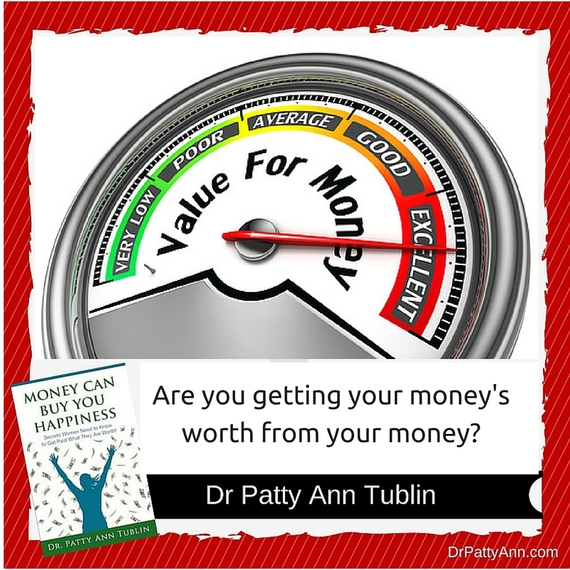Have you ever wondered where all your money goes? Do you control your money? Or does your money control you?
As the U.S. deadline for filing your tax return rapidly approaches (April 15), many of us suddenly realize we have no idea where our money goes. We haven't a clue as to what we spent our money on.
No, this is not a blog about investing. This is a blog about valuing your hard-earned money so you can take control of how -- and on what -- you spend your money. This is a blog about giving your money a purpose that enriches your life!
Emotional Spending
Many people spend money to soothe emotions. They use money as an emotional elixir. Remember that time you were really pissed off at your partner -- so you went shopping to blow off some steam? The next thing you know you bought a new pair of shoes and a pair of pants -- neither of which you really needed.
Initially the purchases made you feel good; however this was a fleeting high.
Using money to buy things you don't really need (and sometimes don't even want) as a way of ineffectively dealing with emotions you don't want to feel: i.e., anger, jealousy, depression, loneliness, frustration, boredom, puts you in the precarious position of wasting your money on unnecessary purchases throughout your life.
You are not getting your money's worth -- from your money -- when you spend this way. This money was spent without any real thought behind the spending. It was spent without a conscious purpose.
Emotional spending is like reaching for junk food to satisfy your hunger. The fix is short-term, leaving us hungry shortly after the junk food has been consumed. Emotional spending very temporarily soothes our emotions; however it is only a matter of time before these same emotions we were trying to tame reappear following our purchase.
And the emotional spending cycle continues...
Impulsive Spending
Impulsive spending brought on by that awesome two-day only sale can also be a way of having your emotions control your money.
Even though that coat you purchased was 50 percent off the regular price, if you had no intention of buying the coat when you walked into the store, (or logged onto the internet) you just wasted money on an impulsive purchase. You can kid yourself into thinking you saved 50 percent off the retail price, but the fact of the matter is you didn't save any money at all. You just wasted the money you did spend.
A purchase bought on sale isn't a bargain unless you needed the item purchased, regardless of whether it was on sale or not!
Retail marketers know this and they play into the pleasure-center of our brain when they promote a time-limited sale. They understand the brain is hard-wired for pleasure -- with the anticipation of pleasure being just as strong an influence on our brain's pleasure-center as the actual purchase. Hence the heightened frenzy we feel in anticipated of a sale!
Emotional spending and impulsive spending both help explain why the clothes and accessories in your closet have never been worn or used -- with the price tags still attached to them.
Consciously Create a Purpose for Your Money
You work hard for your money. You are entitled to enjoy it and to make an indulgent purchase on occasion. The key to controlling your money instead of having your money control you is based upon the ability to make a conscious decision on how much money you will spend on these indulgent (and perhaps frivolous) purchases.
Find a conscious way to give your money a purpose and meaning specific to what you want for your life (and lifestyle). Decide how you want your money to improve the quality of your life now -- and in the future.
Giving your money a purpose will help you avoid throwing your money away on emotional and impulsive purchases.
Take control of your hard-earned cash, instead of having your cash control you.
You work hard for your money -- make sure you put it to good use!
To learn more about your relationship to money you might want to check out my Amazon best-selling book: Money Can Buy You Happiness: Secrets Women Need to Know to Get Paid What They Are Worth!.
#womenandmoney #womenatwork
To learn more about Dr. Patty Ann visit:
www.relationshiptoolbox.com
http://bit.ly/linkedin-dpa
twitter: @drpattyann
facebook.com/relationshiptoolbox

